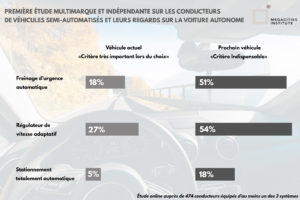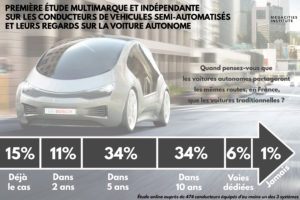
First independent and multi-brand study on drivers of semi-automated vehicles and their vision on autonomous car Categories: 2019, News Timelines: Almanya, Arjantin, Birleşik Krallık, Brezilya, Çin, Fas, Fransa, Güney Afrika, Hindistan, İspanya, İtalya, Kolombiya, Meksika, Orta Amerika, Peru, Polonya, Portekiz, Rusya, Şili, Tayland, Türkiye, Ukrayna, Vietnam
Announcement Date : 20 Şubat 2019
- Advanced driver assistance systems have already an impact on roads by inducing a safer driving (accidents, insurance…).
- Two thirds of drivers who own semi-automated vehicles are ready for self-driving car.
- For the vast majority of respondents, self-driving cars are no longer fiction but a near future.
Megacities Institute, with the support of its founding members, Allianz, Bosch and GiPA, has completed the first independent and multi-brand study with semi-automated vehicle drivers. If they represent a minority on the road, more and more vehicles are equipped with automated emergency braking systems, adaptive cruise control systems or automated parking systems. Their numbers increase rapidly.
Driver assistance systems in order to enhance road safety
Vehicles equipped with automated emergency braking systems and adaptive cruise control reduce the number of accidents. Automated emergency braking system can compensate the lack of reactivity from the driver in 40% of fatal accidents. The adaptive cruise control allows the vehicle to decelerate when traffic conditions change abruptly. Speed is the first cause of deadly accidents in France, with 29% of cases.
According to François Nédey, Member of the Executive Committee of Allianz France, administrator of Megacities Institute and co-leader of the international ecosystem Autonomous Vehicles of the Allianz group, “These driver assistance systems help to improve road safety. In France, the proportion of accidents occurring at low speed in the city center is very important. In particular, we observed that automated braking in the city center considerably reduced the number and the severity of accidents because shocks are less brutal at low speeds“.
The presence of emergency braking and adaptive cruise control is popular among drivers of equipped vehicles: 70% of drivers for the first and 75% for the second state that these systems are important in the choice of their vehicle.
The automated emergency braking, an equipment to avoid collisions
94% of drivers keep emergency braking activated, permanently. However, “For 44% of drivers interviewed, the emergency braking system could be triggered in a situation that does not require it” tempers Odette Dantas, Deputy General Manager GiPA France, Vice President of Megacities Institute. She adds, “For 40% of drivers, the emergency braking of their car remains below their expectations”. The surprise of the sudden triggering of the emergency braking system, the noise generated, the brutal braking can cause stress for the drivers.
“For every driver, it would be necessary to be put in the emergency braking situation when handing over the vehicle keys to get a first experience,” says Franck Cazenave, Director of Smart Cities and Autonomous Vehicle for Bosch France and President of Megacities Institute.
Adaptive cruise control, a regular use
79% of drivers regularly activate the adaptive cruise control, 19% do it sometimes. Drivers appreciate this driver assistance for the safety provided. “For 48% of the drivers surveyed, the safety provided by adaptive cruise control is better than they expected before using it. In fact, 86% of drivers say that the risk of malfunction is less than or equal to what they thought before they had the experience” says Odette Dantas.
The adaptive cruise control is more and more often coupled with the function of lane keeping systems in the traffic way. “In a turn, for example, the vehicle will stay on the lane chosen by the driver. If the driver does not interfere on the direction of the vehicle, an automatic correction is made,” explains Franck Cazenave.
The fully automated parking, a low driver satisfaction
Only 23% of drivers regularly use this driver assistance, which is more than three times less than the adaptive cruise control. Drivers whose vehicles are equipped with this feature for parking are not satisfied because of the “slowness” and “imperfection” of the system. Drivers want a faster system, especially for narrow parking spaces.
Looking ahead, drivers believe that emergency braking (51%), adaptive cruise control (54%) and automated parking (18%) are essential for their car. According to François Nédey, “in France, 43% of the dead and 70% of the seriously injured are vulnerable users, which means pedestrians, cyclists and motorcyclists. The trajectory towards self-driving cars will contribute to the reduction vulnerable users deaths“.
The autonomous car, a natural and expected evolution
The last axis of the study concerns the self-driving car. It means a vehicle without any driver intervention, a “robomobile”.
65% of semi-automated vehicle drivers are open to use a self-driving car. “Semi-automated vehicle drivers feel technology benefits in their daily life and enjoy them. They are much more ready for self-driving cars than drivers of cars without these driver assistance systems,” says Franck Cazenave. Finally, it is important to know that 60% of drivers think that self-driving cars will share the same roads as classic cars in less than 5 years.
Methodology
Online survey conducted by GiPA between 25th of October and 2nd of December 2018 on a sample of 474 drivers whose vehicle is equipped with at least one of the three-driver assistance systems studied.
Megacities Institute
Megacities Institute is an association under French law with headquarter in Paris. Allianz, Bosch and GiPA have founded it. The institute is a research platform opened to all contributors, companies, local authorities and universities, in Europe and around the world.
Megacities Institute’s ambition is to study the diversity of solutions put in place by megacities around the world to solve their problems, evaluate them, and make them known. Then, the Institute wants to promote new solutions, based on current and future technologies, to make these cities more welcoming to humans and, more generally, to all living species. Finally, the Institute will endeavor to know the expectations of the populations by questioning them and by involving them in various initiatives.
Find all the information of the Megacities Institute on its website:
Association Megacities Institute
54 rue Lamartine
75009 Paris















